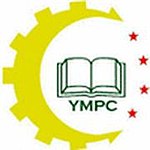
The Moro Islamic Liberation Front is a group based in Mindanao, Philippines seeking an autonomous region of the Moro people from the central government. The group has a presence in the Bangsamoro region of Mindanao, the Sulu Archipelago, Palawan, Basilan, and other neighbouring islands.

The Autonomous Region in Muslim Mindanao was an autonomous region of the Philippines, located in the Mindanao island group of the Philippines, that consisted of five predominantly Muslim provinces: Basilan, Lanao del Sur, Maguindanao, Sulu, and Tawi-Tawi. It was the only region that had its own government. The region's de facto seat of government was Cotabato City, although this self-governing city was outside its jurisdiction.

The collective term Moro people or Bangsamoro people refers to the 13 Islamized ethnolinguistic groups of Mindanao, Sulu, and Palawan, native to the region known as the Bangsamoro. As Muslim-majority ethnic groups, they form the largest non-Christian majority population in the Philippines, and comprise about 5% of the country's total population, or 5 million people.

The Moro National Liberation Front is a political organization in the Philippines that was founded in 1972. It started as a splinter group of the Muslim Independence Movement. The MNLF was the leading organization among Moro separatists for about two decades beginning from the 1970s.
The Young Moro Professionals Network (YMPN) is a non-governmental organization (NGO) composed of young Moro professionals advocating peaceful means to improve the socio-economic well-being of the Bangsamoro people. While a majority of members live in the Philippines, particularly in Metro Manila and Mindanao, there are several members who are based in other countries. YMPN members are largely employed, both in government and private sector jobs.

The Moro conflict is an insurgency in the Mindanao region of the Philippines which has been ongoing since 1969, though non-Jihadist insurgency ended in 2019.
Consortium of Bangsamoro Civil Society, abbreviated as CBCS, is the largest umbrella civil society organization (CSO) composed of 168 Moro non-governmental organizations (NGOs) and peoples organizations (POs) in Mindanao, Philippines.
Maradeka is an emerging pro-democracy Muslim political organization espousing non-violent political action in the Philippines amidst the backdrop of over four decades of armed Muslim insurgency mounted by Moro National Liberation Front (MNLF) and Moro Islamic Liberation Front (MILF) in their Moro Quest for self-rule after people dissenting Philippine government treatment of Muslim minority as second class citizens and suffering years of social, economic, and political inequities called Mindanao problem
In the late 1960s, an independence movement was founded in Mindanao, the Philippines to separate the Muslim majority-Moro areas from the rest of the Philippines. The area is now called the Bangsamoro.
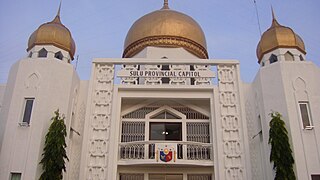
Bangsamoro, officially the Bangsamoro Autonomous Region in Muslim Mindanao or BARMM, is an autonomous region located in the southern Philippines.

The Framework Agreement on the Bangsamoro is a preliminary peace agreement signed in the Malacañan Palace in Manila, Philippines on October 15, 2012. The agreement calls for the creation of an autonomous political entity named Bangsamoro, replacing the Autonomous Region in Muslim Mindanao (ARMM) which was described by Former President Benigno Aquino III as "a failed experiment".

Ahod Balawag Ebrahim better known as Al-Hajj Murad Ebrahim is a Moro Filipino politician and rebel leader currently serving as the first and interim Chief Minister of the Bangsamoro Autonomous Region in Muslim Mindanao.
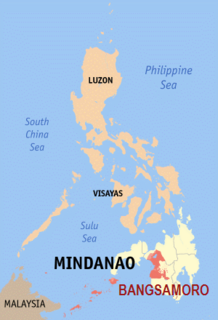
The Comprehensive Agreement on Bangsamoro (CAB) is a final peace agreement signed between the Government of the Philippines and the Moro Islamic Liberation Front on March 27, 2014 at the Malacañang Palace in Manila. Under the agreement, the Islamic separatists would turn over their firearms to a third party, which would be selected by the rebels and the Philippine government. The MILF agreed to decommission its armed wing, the Bangsamoro Islamic Armed Forces (BIAF). In return, the government would establish an autonomous Bangsamoro. Power sharing was a central point to the autonomy redesign.

The 1976 Tripoli Agreement was signed on December 23, 1976 in Tripoli, Libya by Carmelo Z. Barbero, representing the Government of the Philippines and Nur Misuari of the Moro National Liberation Front. The agreement defined autonomous administrative divisions for Muslims in the southern Philippines, the establishment of an autonomous government, judicial system for Sharia law and special security forces, and the observance of a ceasefire. The autonomous region was to have its own economic system, including an Islamic bank.

The Jeddah Accord was signed on January 3–4, 1987 in Jeddah, Saudi Arabia by Aquilino Pimentel Jr., representing the Government of the Philippines and Nur Misuari of the Moro National Liberation Front. The two panels agreed upon the continued discussion of the proposal of the grant of full autonomy to Mindanao, Basilan, Sulu, Tawi-Tawi and Palawan subject to democratic processes.
The 1996 Final Peace Agreement, also called the Jakarta Accord was signed on September 2, 1996 in Manila, Philippines by Manuel Yan, representing the Government of the Philippines and Nur Misuari of the Moro National Liberation Front. The culmination of four years of peace talks, the agreement established mechanisms designed to bring about the full implementation of the 1976 Tripoli Agreement.

The Battle of Camp Abubakar, codenamed Operation Terminal Velocity, was the final phase of the 2000 Philippine campaign against the Moro Islamic Liberation Front which resulted in the capture of Camp Abubakar al Siddique, stronghold of the Moro Islamic Liberation Front and its largest settlement, and seat of its Shariah-based government.
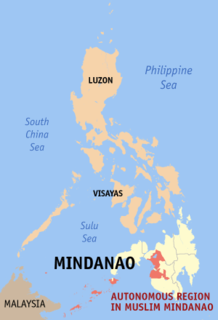
The 2000 Philippine campaign against the Moro Islamic Liberation Front was a military campaign conducted by the Armed Forces of the Philippines (AFP) against a Muslim secessionist group that took place during the presidency of Joseph Estrada in the Autonomous Region in Muslim Mindanao in the Philippines. The campaign was waged "to weaken the Moro Islamic Liberation Front's capability to undermine the territorial integrity of the Philippines and inflict harm on both government personnel and civilians".
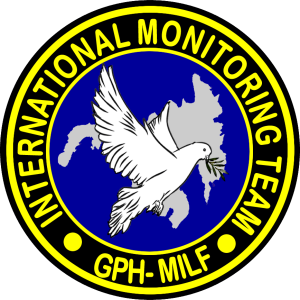
The International Monitoring Team (IMT) is a monitoring team composed of 60 members headquartered in Cotabato City, Mindanao of the Philippines to monitor the implementation of peace between the Government of the Philippines (GPH) and one of the largest rebels in the region, the Moro Islamic Liberation Front (MILF) in the Moro conflict. The team is led by Malaysia, and followed by Brunei Darussalam, Indonesia, Japan, Libya, Norway and subsequently the European Union.
Timuay Melanio Umbit Ulama is a Filipino politician, ancestral leader, and peace advocate who serves as the Indigenous Peoples' Affairs Minister of Bangsamoro and a member of the Bangsamoro Transition Authority Parliament.
